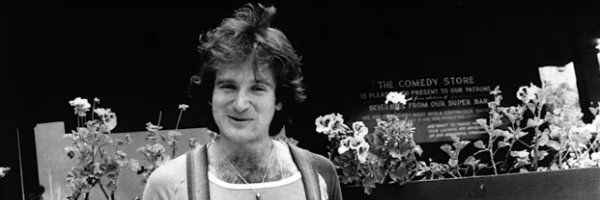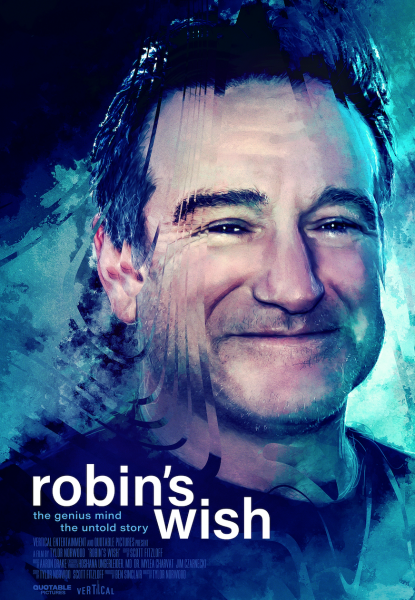As a veteran entertainment reporter I am constantly asked, 'what's the best and worst interview you've ever done?' and I give the same answer for both -- Robin Williams.
I was in college when I interviewed Williams for a tiny movie called House of D starring Anton Yelchin, and directed by David Duchovny. The movie wasn't terribly memorable, but the interview was unforgettable. I describe it as the worst interview I've ever done simply because I don't think that Williams answered a single question with a straight answer. And yet, at the same time, it was also the best interview I've ever done, because Williams spent the entire time making everyone in the room laugh. He had to. It was part of his need to control his environment, because there were things going on beneath the surface that he couldn't control. He fed off that laughter, and it no doubt kept him going, like coal in a train's engine. And when our time was up and Williams had left the room, I asked my more experienced colleagues, 'are they all like that?' But I already knew the answer:
No. No they are not.
That trip down memory lane was my long way of telling you that Vertical Entertainment has released a trailer for the documentary Robin's Wish, which details Williams' final days and his fight against Lewy Body Dementia. Williams' battle with the deadly neurodegenerative disorder is shown in stunning detail through a journalistic lens that sheds an entirely new light on the tragedy, beauty and power behind the mind of one of the greatest entertainers of all time.
Tylor Norwood directed the documentary and crafted the story with Scott Fitzloff, and the film features the comedian's widow, Susan Schneider Williams, as well as Shawn Levy, John R. Montgomery, Rick Overton and David E. Kelley, among others. Vertical will release Robin's Wish on VOD and digital platforms on Sept. 1.
Watch the trailer below, which arrived in my inbox with statements from Susan Schneider Williams and director Tylor Norwood. For more on the impact that Williams had on those around him, click here for Perri Nemiroff's interview with The Rental star Sheila Vand, who shared the Broadway stage with the actor in Bengal Tiger at the Baghdad Zoo.
--
Susan Schneider Williams Statement
When my husband Robin Williams died, the whole world grieved. It’s enough to grieve personally over this type of loss, and then to have the entire world grieving with you -- that pushed it into a different realm altogether. Robin was one of the most beloved artists in the world, a comic genius, whose mind functioned on a mighty level. Yet in the end, it was a little known disease in his beautifully gifted brain that became his greatest and final battle.
During the last year of his life, Robin was confronted with anxiety, paranoia, insomnia, scary altered realities and a roller coaster of hope and despair. With our medical team’s care we chased a relentless parade of symptoms but with very little gain. It wasn’t until after Robin’s passing, in autopsy, that the source of his terror was revealed: he had diffuse Lewy body disease. It was one of the worst cases medical professionals had seen.
Armed with the name of a brain disease I’d never heard of, I set out on a mission to understand it, and that led me down my unchosen path of advocacy. With invaluable help from leading medical experts, I saw that what Robin and I had gone through, finally made sense — our experience matched up with the science. And what I discovered along the way was bigger than me, and bigger than Robin. The full story was revealed during the making of this film and it holds the truth that Robin and I had been searching for.
Robin’s Wish is Robin’s story, it’s our story, and in some ways it’s a universal one — as we all understand what it means to search for answers, to experience love and loss and the power of healing that keeps us going.
Finally, a note about the film title: Robin wanted to help all of us be less afraid. That was Robin’s wish. We had been discussing what we wanted our legacies to be in life; when it was our time to go, how we wanted to have made people feel. Without missing a beat, Robin said, “I want to help people be less afraid.”
Director Tylor Norwood Statement
Robin’s Wish is the retelling of an ending to a story that was never done the justice it deserved. Robin Williams was very much an influence on my life and so when he passed with such violence and general uncertainty it affected me deeply. However, like most people, I quickly buried that uncertainty as I went about my life, too busy with my day to day affairs to treat the questions around Robin’s passing as much more than a place I’d rather not go — telling myself instead that I would remember him only as the man who made me laugh and feel so much in my life. This process of denial of Robin as a man instead of a string of characters was interrupted when his widow, Susan, reached out to me to ask if I’d have any interest in making a science documentary about a neurological disease I’d never heard of — Lewy body dementia. I told her no, and that it would take years until we’d be sitting in a theater and watching any movie I agreed to make, so I asked her what would sustain her in that. She began telling me about herself and Robin, and what they went through in the last year and a half of his life. I told her if that was the film, I was in.
What followed was years of tracking down the facts of Robin’s case from his friends, neighbors, co-workers, widow and medical professionals that gave me a clear view of a compelling story I’d never heard before about one of the greatest entertainers to ever live. In the end I think we’ve done the work of restoring a legacy that had been tainted by a fundamental misunderstanding. It was in the spirit of completing the record, and honoring Robin with giving the world the truth of what took him from us that I think this film shines, and can serve as a moment for the world to look deeper into this beautiful man’s story. It is a moment for us to understand the pain he felt as his talents and faculties rapidly slipped away, and moreover how in the face of that terrifying reality, he was more heroic, more compassionate than any character he ever played in any of his movies. So I hope this film rights a wrong that was done to him, and takes away a cloud that has unjustly hung over his legacy for far too long.


